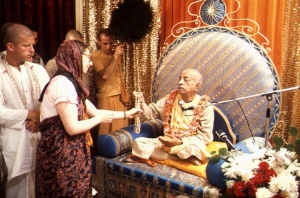CC Madhya 6.261: Difference between revisions
m (1 revision(s)) |
No edit summary |
||
| Line 1: | Line 1: | ||
{{ | [[Category:Sri Caitanya-caritamrta - Madhya-lila Chapter 06|C261]] | ||
<div style="float:left">'''[[Sri Caitanya-caritamrta|Śrī Caitanya-caritāmṛta]] - [[CC Madhya|Madhya-līlā]] - [[CC Madhya 6|Chapter 6: The Liberation of Sārvabhauma Bhaṭṭācārya]]'''</div> | |||
<div style="float:right">[[File:Go-previous.png|link=CC Madhya 6.260|Madhya-līlā 6.260]] '''[[CC Madhya 6.260|Madhya-līlā 6.260]] - [[CC Madhya 6.262|Madhya-līlā 6.262]]''' [[File:Go-next.png|link=CC Madhya 6.262|Madhya-līlā 6.262]]</div> | |||
{{CompareVersions|CC|Madhya 6.261|CC 1975|CC 1996}} | |||
{{RandomImage}} | |||
==== TEXT 261 ==== | ==== TEXT 261 ==== | ||
<div | <div class="verse"> | ||
tat te ’nukampāṁ su-samīkṣamāṇo | :tat te ’nukampāṁ su-samīkṣamāṇo | ||
bhuñjāna evātma-kṛtaṁ vipākam | :bhuñjāna evātma-kṛtaṁ vipākam | ||
hṛd-vāg-vapurbhir vidadhan namas te | :hṛd-vāg-vapurbhir vidadhan namas te | ||
jīveta yo bhakti-pade sa dāya-bhāk | :jīveta yo bhakti-pade sa dāya-bhāk | ||
</div> | </div> | ||
| Line 14: | Line 18: | ||
==== SYNONYMS ==== | ==== SYNONYMS ==== | ||
<div | <div class="synonyms"> | ||
''tat''—therefore; ''te''—Your; ''anukampām''—compassion; ''su-samīkṣamāṇaḥ''—hoping for; ''bhuñjānaḥ''—enduring; ''eva''—certainly; ''ātma-kṛtam''—done by himself; ''vipākam''—fruitive results; ''hṛt''—with the heart; ''vāk''—words; ''vapurbhiḥ''—and body; ''vidadhan''—offering; ''namaḥ''—obeisances; ''te''—unto You; ''jīveta''—may live; ''yaḥ''—anyone who; ''bhakti-pade''—in devotional service; ''saḥ''—he; ''dāya-bhāk''—a bona fide candidate. | |||
</div> | </div> | ||
| Line 21: | Line 25: | ||
==== TRANSLATION ==== | ==== TRANSLATION ==== | ||
<div | <div class="translation"> | ||
The Bhaṭṭācārya recited, “‘One who seeks Your compassion and thus tolerates all kinds of adverse conditions due to the karma of his past deeds, who engages always in Your devotional service with his mind, words and body, and who always offers obeisances unto You is certainly a bona fide candidate for becoming Your unalloyed devotee.’” | The Bhaṭṭācārya recited, “‘One who seeks Your compassion and thus tolerates all kinds of adverse conditions due to the karma of his past deeds, who engages always in Your devotional service with his mind, words and body, and who always offers obeisances unto You is certainly a bona fide candidate for becoming Your unalloyed devotee.’” | ||
</div> | </div> | ||
| Line 28: | Line 32: | ||
==== PURPORT ==== | ==== PURPORT ==== | ||
<div | <div class="purport"> | ||
When reciting this verse from Śrīmad-Bhāgavatam ([[SB 10.14.8]]), Sārvabhauma Bhaṭṭācārya changed the original reading from mukti-pade to bhakti-pade. Mukti means liberation and merging into the impersonal Brahman effulgence. Bhakti means rendering transcendental service unto the Supreme Personality of Godhead. Because of having developed pure devotional service, the Bhaṭṭācārya did not like the word mukti-pade, which refers to the impersonal Brahman feature of the Lord. However, he was not authorized to change a word in Śrīmad-Bhāgavatam, as Śrī Caitanya Mahāprabhu will explain. Although the Bhaṭṭācārya changed the word in his devotional ecstasy, Śrī Caitanya Mahāprabhu did not approve of it. | When reciting this verse from [[Srimad-Bhagavatam|''Śrīmad-Bhāgavatam'']] ([[SB 10.14.8]]), Sārvabhauma Bhaṭṭācārya changed the original reading from ''mukti-pade'' to ''bhakti-pade. Mukti'' means liberation and merging into the impersonal Brahman effulgence. ''Bhakti'' means rendering transcendental service unto the Supreme Personality of Godhead. Because of having developed pure devotional service, the Bhaṭṭācārya did not like the word ''mukti-pade'', which refers to the impersonal Brahman feature of the Lord. However, he was not authorized to change a word in [[Srimad-Bhagavatam|''Śrīmad-Bhāgavatam'']], as Śrī Caitanya Mahāprabhu will explain. Although the Bhaṭṭācārya changed the word in his devotional ecstasy, Śrī Caitanya Mahāprabhu did not approve of it. | ||
</div> | </div> | ||
__NOTOC__ | |||
<div style="float:right; clear:both;">[[File:Go-previous.png|link=CC Madhya 6.260|Madhya-līlā 6.260]] '''[[CC Madhya 6.260|Madhya-līlā 6.260]] - [[CC Madhya 6.262|Madhya-līlā 6.262]]''' [[File:Go-next.png|link=CC Madhya 6.262|Madhya-līlā 6.262]]</div> | |||
__NOTOC__ | |||
__NOEDITSECTION__ | |||
Revision as of 15:24, 30 July 2021

A.C. Bhaktivedanta Swami Prabhupada
TEXT 261
- tat te ’nukampāṁ su-samīkṣamāṇo
- bhuñjāna evātma-kṛtaṁ vipākam
- hṛd-vāg-vapurbhir vidadhan namas te
- jīveta yo bhakti-pade sa dāya-bhāk
SYNONYMS
tat—therefore; te—Your; anukampām—compassion; su-samīkṣamāṇaḥ—hoping for; bhuñjānaḥ—enduring; eva—certainly; ātma-kṛtam—done by himself; vipākam—fruitive results; hṛt—with the heart; vāk—words; vapurbhiḥ—and body; vidadhan—offering; namaḥ—obeisances; te—unto You; jīveta—may live; yaḥ—anyone who; bhakti-pade—in devotional service; saḥ—he; dāya-bhāk—a bona fide candidate.
TRANSLATION
The Bhaṭṭācārya recited, “‘One who seeks Your compassion and thus tolerates all kinds of adverse conditions due to the karma of his past deeds, who engages always in Your devotional service with his mind, words and body, and who always offers obeisances unto You is certainly a bona fide candidate for becoming Your unalloyed devotee.’”
PURPORT
When reciting this verse from Śrīmad-Bhāgavatam (SB 10.14.8), Sārvabhauma Bhaṭṭācārya changed the original reading from mukti-pade to bhakti-pade. Mukti means liberation and merging into the impersonal Brahman effulgence. Bhakti means rendering transcendental service unto the Supreme Personality of Godhead. Because of having developed pure devotional service, the Bhaṭṭācārya did not like the word mukti-pade, which refers to the impersonal Brahman feature of the Lord. However, he was not authorized to change a word in Śrīmad-Bhāgavatam, as Śrī Caitanya Mahāprabhu will explain. Although the Bhaṭṭācārya changed the word in his devotional ecstasy, Śrī Caitanya Mahāprabhu did not approve of it.